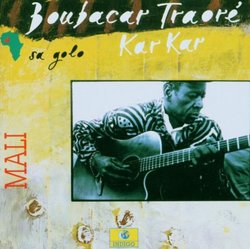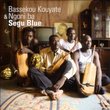| All Artists: Boubacar Traore Title: Sa Golo Members Wishing: 2 Total Copies: 0 Label: Harmonia Mundi USA Original Release Date: 4/22/1997 Re-Release Date: 8/8/2000 Album Type: Import, Original recording reissued Genres: Folk, International Music Style: Africa Number of Discs: 1 SwapaCD Credits: 1 UPC: 794881364725 |
Search - Boubacar Traore :: Sa Golo
 | Boubacar Traore Sa Golo Genres: Folk, International Music Recorded in 1996, this is the real Boubacar Traoré, just his voice and acoustic guitar, with percussion from his childhood pal Baba Dramé on the calabash. While Traoré's playing has often invited comparisons... more » |
Larger Image |
CD DetailsSynopsis
Amazon.com Recorded in 1996, this is the real Boubacar Traoré, just his voice and acoustic guitar, with percussion from his childhood pal Baba Dramé on the calabash. While Traoré's playing has often invited comparisons to the bluesy pentatonic tones of Ali Farka Toure, the man affectionately known as Kar Kar has been around longer--since the 1960s. On Sa Golo, Traoré's focus is more on the more traditional Malian griot style (and the closing cut, "Soundiata," is one of the most famous griot tunes) than most of Toure's work. Music rarely gets more spare than Sa Golo, where the silences are as eloquent as the notes, each carefully chosen and played, with Traoré's voice almost hypnotic over the top. His playing, too, has never been better--never compressing the material but letting it flow to a natural, winding conclusion. If records had a heart, this one would be beating strongly, with the title track and "Dounia" as special standouts. By far the best of Traoré's worthy albums. --Chris Nickson Similar CDs
|
CD ReviewsLet Kar Kar Sing For you "Ian Herrick" | San Jose, CA | 03/08/2005 (5 out of 5 stars) "Kar Kar is an amazing musician. I speak about three words of Bamana ("Mousso," "Dounia," and "Jali"), but Kar Kar has me singing along on these great tunes. Kar Kar's music is very different than Bambara and Mandinko jali (griot) music. He is not a jali, so while his lyrics may cover similar themes and his melodies and rhythms are definately African, he is freer to compose material in a different style and mood with a different goal in mind. If you go see Kar Kar perform, you will not see him praising noble members of his audience (there comes a point in every jali performance when members of the audience give money to the jalis in response to praises.) In this respect he is similar to Ali Farka Toure, who is also not of the griot class. But Toure is from a different part of Mali and a member of a different ethnic group (the Songhai). While both play music that can be called African blues, they have a completely different feel to them. Kar Kar's music is perhaps more subtle. Kar Kar's guitar playing is stunning on all his albums. "Sa Golo" is no different. Listening to songs like "Dounia" (a variant of the Bambara love song "Diarabi")one can't help but wonder what influenced what: Does Kar Kar's music have a Spanish influence or is what we think of as Spanish actually African in origin? More likely, though, it that it is all a big interlocking tangle of influence-- African music and Arabic music influenced Spanish music, African music meshed with Spanish music to become the Caribean "Latin" sound which in turn became very popular in West Africa. All of these no doubt contribute to Kar Kar's music, but his guitar playing, with its crisp treble flourishes, solid bass rhythms, and clean melodic echoing of the vocals, is unique. Baba Drame's playing of the calabash perfectly accentuates Kar Kar's rhythms, making it quite danceable. Even through the language barrier, one can sense that Kar Kar's music is about love -- love for his deceased wife, love for his dead brother, love for his country and his culture. The latter introduces a strong theme on this album with the songs "Sa Golo" and "Mouso Teke Soma Ye." Both of these deal with the exclusion of women from certain ceremonies. Kar Kar loves his country and his culture, but love can really hurt sometimes. Especially when part of what you love you don't agree with. You can hear in his voice how it pains him that his beautiful culture can be so unfair to women. "Mouso Teke Soma Ye" is a challenge to the traditional healers of his people, asking why women cannot be admitted to the secret societies when they give birth to the men who can. Love also gives Kar Kar a wonderful feel for the blues. The two bluesiest songs on this album are "Ntaara Diagnamogo Fe" and "Je Chanterai Pour Toi" -- the latter sung in French. The first is one of the oldest blues stories around -- a man goes to see his girl but her papa chases him away. The second means "I will sing for you," and in it Kar Kar croons in his wonderful smoky voice, that if she knew how much he loved her, she would have to love him too. "Hold me in your arms," he sings, "I will sing for you."" Folksy, bluesy, and a little maudlin Bruce Whitehouse | Bethlehem, PA United States | 01/24/2001 (4 out of 5 stars) "Traore's recordings are usually about as minimal as can be: an acoustic guitar and a voice, both supplied by him. He's got a unique, distinctive style: his songs tend to be slow, his playing style crisp, and his voice plaintive. It makes for good listening on an occasional basis, but I find I can't listen to it very often. One song sounds very much like the next (does he even change keys?); he overindulges in sentimentality. Still, Traore's music is worth listening to, particularly for fans of Malian music. Look for the song "Santa Maria," which I have yet to find on a CD in the States, and also look for his life story as related to Lieve Joris in her travel memoir "Mali Blues." After I read about his life, I understood why his music is so sad."
|


